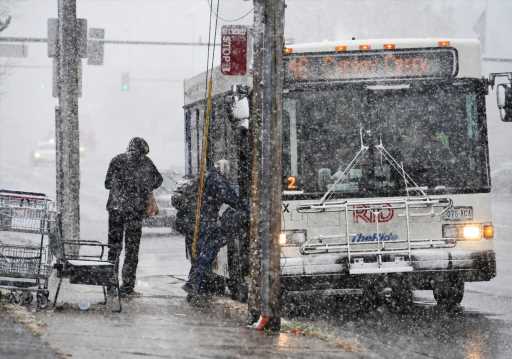With freezing temps and more snow bearing down on the Front Range this week, Denver officials said they plan to adjust the policy dictating how cold it must be before the city opens recreation centers to people as emergency warming shelters.
The impending changes were discussed Wednesday morning during a meeting of the Denver City Council’s safety committee in which some committee members criticized the current policy for not being informed by any medical research.
Members of the city’s housing, public health and public safety departments appeared before the committee for a briefing on winter shelter policies. While a bulk of the conversation focused on unsheltered homelessness, daytime warming shelters are open to anyone who needs refuge from severe weather.
In an informational document that the city’s Department of Housing Stability finalized last month, it shows that daytime emergency warming shelters are only activated when the National Weather Service issues a wind chill advisory, watch or warning.
The general rule for when that might happen, the document says, is when temperatures below 10 degrees are forecast or when 6 inches or more of snow is expected.
Advocates are asking the city to instead activate emergency warming shelters when the forecast calls for temperatures of 20 degrees or lower with dry conditions or temperatures of 32 degrees or lower with wet conditions.
Daytime warming shelters will be open on Thursday and Friday in Denver, public health officials confirmed.
That recently formalized rule, first highlighted in a tweet and then on a Reddit post, drew the ire of online commenters, medical professionals and some City Council members for being unsafe.
“I have concerns and curiosity about the standards and if they were informed by any medical providers?” Councilwoman Candi CdeBaca asked during Wednesday’s meeting.
The decision to activate daytime warming shelters is made by the Denver Department of Public Health and Environment. In responding to CdeBaca’s question, Gregg Thomas,c director of the department’s environmental quality division, said the daytime warming shelter standards have been in place for decades but are now being revisited.
Not only is the department looking at overnight low temperatures but also the forecasted highs for the next day when considering whether to turn all active rec centers into emergency warming shelters, he said.
“I think this is a work in progress,” Thomas said. “We continue to make refinements and we will do deep dives on that public health impact of temperature and activations.”
CdeBaca noted that standards set without consulting medical clinicians were dangerous not just for unhoused people but many other Denverites, including those who may not have access to personal transportation and rely on public transit to get around.
In an email sent to all council members Wednesday, Denver physician Sarah Stella called the current threshold an important public health issue.
“I, unfortunately, have personally witnessed many cases of hypothermia and frostbite injury from only moderately cold temperatures, particularly when damp conditions also exist,” Stella wrote.
Even if not activated as daytime warming shelters, Denver rec centers wouldn’t turn people away if they said they needed to get out of the cold and snow, Thomas said. Libraries are also open to the public during the day.
Members of the city’s housing department emphasized that, since the pandemic, the city’s homeless shelter network has pivoted to a model in which shelters are open 24 hours a day and there are options to transport people to those shelters to get out of the cold.
One of the sticking points with the city’s ongoing efforts to push unhoused people into the shelter network is that some simply don’t want to go. Councilwoman Robin Kniech touched on that Wednesday, noting some people are not comfortable in facilities with hundreds of other people or don’t want to go through a lengthy intake process when they don’t intend to stay overnight.
Jess Wiederholt, a street outreach worker with the grassroots homeless support group Mutual Aid Monday, noted some people living on the streets have been put on lists banning them from certain shelters. Others refuse to go to them because of past trauma or because the facilities won’t allow them to bring in their pets.
Advocates also want “more proactive communication of when these things are going to be active,” Wiederholt said of the warming shelters. “Folks have to plan.”
Denver rec centers typically close between 8 and 9 p.m. City housing officials feel they are well prepared for an influx of people into overnight shelters if necessary during this week’s severe weather.
“We anticipate being able to meet demand with existing overflow capacity,” housing department deputy director Angie Nelson told the safety committee Wednesday.
Source: Read Full Article
-
How much could YOUR council tax go up? Find out with interactive map
-
Denver Office Adam Glasby charged with assault in body-slam incident
-
Ryan Giggs' former partner's parting letter to the star
-
Newborn puppies found dumped in woods with umbilical cords still attached
-
Cabinet bids farewell to Boris Johnson… with Churchill books

